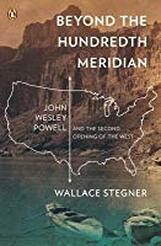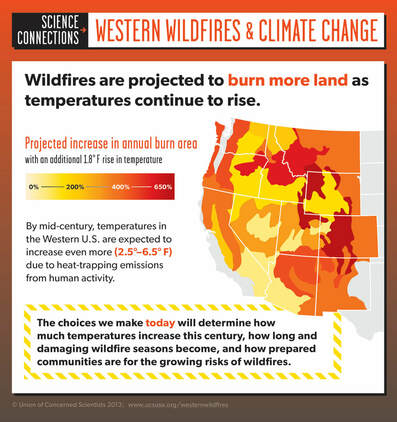 Before I found my way to land management agencies and the world of wildfire and incident response, I wanted to be a history professor. My undergraduate degree is in history and I went off to grad school for an MA in US History, writing a scintillating thesis on the Federal Farm Loan Act of 1916--still a big hit at cocktail parties. By the time I started PIO work, I had a decent general knowledge of western US history but soon found myself reading more on the topic because I wanted to understand the communities I would be serving. I always feel more confident and empathetic when I head into an incident carrying knowledge of the history of the place. I think it also helps build credibility if you show the locals you know about their history or if you're able to frame statements in a way that reflects and aligns with the local history. (Maybe it's just me and my inclination towards history though.)
1 Comment
 In the wildfire world and presumably, the rest of the emergency management world, we have standardized task books but little instruction on how to fill them out and much less on how to evaluate trainees. Most of us rely on our own trainee experiences to inform how we should mark up a task book and interact with our trainees. My own time as a trainee was frustrating because senior PIOs used different criteria to sign off on tasks, not to mention being all over the board on how to put initials in the book. Once I became one of those senior PIOs, the lack of standards and protocols created several (and sometimes difficult) conversations where the trainee was adamant about what tasks I should sign off on. I've also been known to question the parentage of a previous PIO who signed a trainee's task book in a manner contrary to my approach. So, given that there are few standards, here's how I look at PIO task books and training assignments. I hope this helps others work their way through the process. A reminder: Having a signed task book does not make you a good PIO any more than a law degree makes a good lawyer. Both jobs demand extensive experience, tutelage, and continuous learning.  I don’t see how we can’t talk about climate change. The facts are overwhelming, the science is sound, and our wildland fire experiences validate both. Now, I get that the topic is uncomfortable and I certainly get that while not official policy, not saying much if anything about climate change is a preference that has been well communicated by the current administration. Obviously, it’s a political minefield and I’m not advocating climbing on top of the soapbox and preaching. Most of the time, I don’t think communicators on wildland fires or other disasters should bring it up. But neither should we shy away from discussing climate change when it is appropriate or when asked by the public, stakeholders, cooperators, or the media. As incident responders, we have the obligation to honestly confront reality and as true crisis communicators we have a responsibility to discuss that reality in a way that establishes competence and confidence. If we dance around the topic in an obvious fashion, we damage our standing and the public’s view of our expertise.
I sat down with Brad Pitassi, who is a PIO1 Lead on one of the Southwest National IMTs when he is not a Captain and PIO for the City of Maricopa Fire Department. We discussed Brad's career, the differences between PIOs and PAOs, the need to understand policy and strategy on dynamic and complex events, continuous learning, the training process, and what traits we like to see in a good PIO.
Soon after the Yarnell Hill Fire, I wrote a paper on my thoughts and experiences. Considering the passage of time and additional assignments, I might change a few things on the periphery but I think the paper stands up well. I did not want to re-write it and I struggled on how to approach this topic for more than a few days. I decided to do a play-by-play of a briefing I gave on the Yarnell Hill Fire. I post this not to call attention to my being there, but because it was a tough briefing and unlike with other briefings out there, I can tell you what I was thinking and feeling as I analyze the questions and answers. (As I noted in Part 1, I would not have been able to do this without the experiences on Wallow and Rodeo-Chedeski.)
I believe this was the Wednesday after the Sunday fatalities and it is the day the Granite Mountain crew buggies were to be returned to their home in Prescott. The media is congregated at a roadblock on the side of the highway leading into Peoples Valley and Yarnell. The plan was for the crew buggies to leave the fire area and pass by us around 10:00, after which I would brief the media. However, there were delays and when the video starts, it is after 11:00 with no sign of the rigs. By that time, it was hitting 100 degrees and you could tell the media personnel were getting short-tempered after standing by for well over an hour. As a result, they started asking questions without a formal start to the briefing. Also, I never wear a radio for briefings, but had one on here so I could monitor the traffic about the crew buggie transport and planned to take it off as soon as I knew they were headed towards us. So, for perhaps the most difficult briefing in my career, everything was going wrong at the start. Many organizations require their employees to undergo regular training on personal ethics. The goal of these trainings is to expose one to the common humanity and encourage you to not be a jerk. Yet while we spend numerous hours on the personal, we rarely talk about the larger ethical issues revolving around what we do as organizations--in this case, as emergency responders--even though many of the decisions we make before and during a crisis have ethical dimensions. For example, in the wildland fire world, we routinely prioritize the protection of communities and major infrastructure over individual homes, smaller clumps of structures, and other values when suppression resources are tight and the number of incidents are large. Is this right? Is it moral? Ethical? Is it ethical for leadership to place those decisions on IMTs and other responders? Is it ethical for the decisions to be made without an extensive public discussion about the values that will be applied to those decisions? To the nonspecialist, disasters have an accidental nature which is related to the factor of surprise when they occur: the normal, structured, everyday aspect of some form of human life is suddenly and directly ruptured via events that initially exceed customary social and physical prediction and control. This... together with a historical and contemporary certainty that some disasters will occur in the near and intermediate future, renders the inevitable fact of disaster a compelling moral or ethical subject. Human well-being and harm will be at stake in ensuing disasters, and this in itself creates moral obligations to prepare for disaster and reflect on the moral principles that do or do not apply in responding to disaster. In times of change, learners inherit the Earth, while the learned find themselves beautifully equipped to deal with a world that no longer exists. --Eric Hoffer Preston Cline is a Wharton guy who recently finished his PhD on mission critical teams. He's smart, generous, and a dynamic speaker. I was honored to read a draft of his dissertation and just received a copy of his finished product. It's full of good stuff that's applicable to incident management and in the future, I'm sure I will reference his work regularly and pay particular attention to the points about developing, conveying, and sustaining expertise. On that topic, perhaps the most thought-provoking passage comes in Preston's introduction: In the fall of 2013, I asked Daniel Kahneman, a Nobel Prize winner in economics, the following question: “What happens to experts when the rate of change exceeds the rate of learning?” His immediate answer was “they cease being experts” (Kahneman, 2013). Indeed. We see the passing-by of former experts regularly. People step out of the stream and can never quite make it back to where they were. But what happens to a profession or an organization when the rate of change exceeds the rate of learning for all of the experts in that field or group? What happens when the problems are too dynamic to work out completely or for the answers to have consistency across time? It seems there are many organizations struggling with this potentiality. In the wildland fire world, we have recently seen a change in how S-520-Advanced Incident Management is taught. Where once it was a "do as I did" experience, today it is evolving into a strategic thinking and stress management class based on adult learning concepts. (Preston's thoughts contributed greatly to this change.) These ideas are slowly working their way through the system. For instance, we also have a movement underway to refine how incident objectives are written so that all responders understand the why behind the what. In the face of rapid change and quickly evolving complexities, we will certainly have to rethink our definition of expertise. Expertise must move from the how and what to the why, from specific knowledge to a higher level of strategic thinking born of experience. Art based on craft. Yet in our world, it also means exposure to a conflict: the drive for certainty (science) and uniformity (legalities) that we see in so many other parts of our society against the uncertainty of incidents, crises, and emergencies that we regularly encounter. Scripted plays versus improvisation out of necessity. (It is most acute after fatalities or serious accidents.) This conflict places a burden on all of us, including academics studying our field, to better explain why we do what we do and to place in context the uncertainties that compel our decisions. There's also a need for doing more at the C&G level. The strategic thinking must now always be there on any extended incident of any type. However, for many (federal at least) IMT members, the ability and time to consider incident issues is severely limited. If we are to truly cultivate and expand expertise, we must invest in the time to reflect, to share, to learn--and it must be more than the drive home after an incident or a couple of days at a team meeting in the spring. The current and future challenges are too great for us to allow anyone's expertise to stagnate or diminish. Apologies for not writing much recently. Lots of wildland fire work here in SW OR, summer days with the family, a new puppy, and getting the daughters ready for another school year. I'll do better.
_____ Jim |
Occasional thoughts on incident response, crisis communications, wildland fire, and other topics.
Docendo disco, scribendo cogito. Blog DOB: 4/26/2018Copyright © Jim Whittington, 2019. Archives
August 2019
Categories
All
|
 RSS Feed
RSS Feed